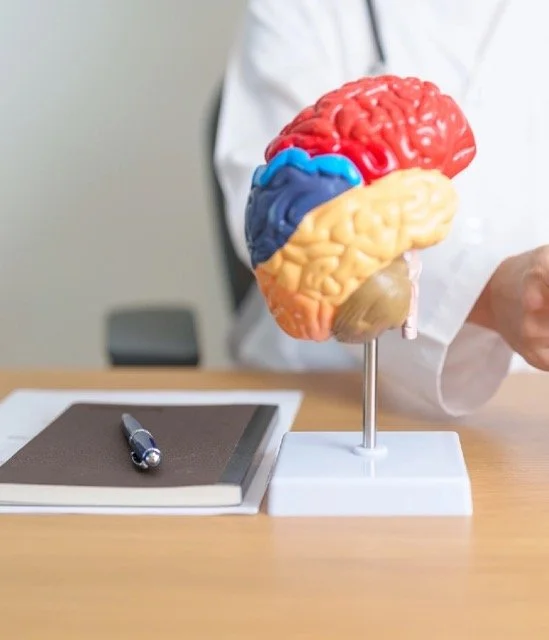Transcranial Magnetic Stimulation (TMS)
TMS is an advanced therapy that offers a breakthrough treatment for those struggling with mental health conditions. At our state-of-the-art clinic, we guide you through every step of your mental health journey—from your initial consultation to long-term support following your treatment sessions, ensuring you receive the best care and lasting results.
What is TMS Therapy?
Transcranial Magnetic Stimulation, or TMS, is a safe and trusted treatment designed to help individuals overcome mental health challenges, including depression, anxiety, and OCD. For those who have struggled with traditional medications or have found little relief through other methods, TMS offers a non-invasive alternative with a proven track record of success.
By using targeted magnetic pulses, TMS stimulates the areas of the brain responsible for mood regulation, helping to restore healthy brain activity. Whether you're seeking relief from depression, anxiety, or other mental health conditions, TMS provides a personalized approach that can be effective even when other treatments have not worked.
Emerald Coast TMS of Fort Walton Beach is committed to delivering the highest standard of care. With years of experience, a dedicated team, and a patient-first approach, we tailor every aspect of your treatment to ensure the best possible outcomes. Our expertise in TMS therapy provides you with a path to recovery and lasting mental wellness.
How TMS Therapy Works
Think of TMS as physical therapy for the brain.
When certain brain networks—like the Salience Network, which helps regulate emotion and focus—become disrupted, it can lead to symptoms like depression, anxiety, or trouble sleeping. TMS strengthens these connections through repeated, targeted pulses that encourage positive brain activity and restore balance.
What More Do You Gain From TMS
Improved Focus
Patients often experience enhanced concentration and cognitive clarity.
Better Sleep
Many individuals report more restful sleep following TMS therapy.
Quick Sessions
Average treatment visits are around 20 minutes—less time than your typical cardio or yoga class.
Immediate Resumption of Activities
Patients can resume normal activities right after treatment.
Encouraged Combination Treatments
It is beneficial to combine TMS therapy with therapy, nutrition plans, exercise, and/or medication.
Proven Success Over Time
Explore the impact and credibility of Transcranial Magnetic Stimulation (TMS) through key data points that showcase its global reach and effectiveness.
The TMS Difference
Safe & Non-Invasive
This FDA-approved therapy requires no sedation or downtime, with only minimal, short-lived side effects for most patients.
Personalized Expert Care
Our dedicated team tailors every step of your TMS journey, providing one-on-one support to ensure your comfort and success.
Effective Alternative to Medication
TMS helps 55–60% of patients who haven’t responded to multiple antidepressants feel significantly better by the end of treatment.
Decades of Proven Innovation
Backed by over 30 years of research, TMS is approved for depression, OCD, and anxious depression, and features advanced protocols like Theta Burst and SAINT.
Frequently Asked Questions
-
Yes, most insurance providers offer coverage for TMS treatment related to major depressive disorder and OCD. However, some plans may assess coverage on a case-by-case basis. Before treatment starts, your dedicated patient advocate will verify your coverage and review your benefits, ensuring you understand the estimated costs involved.
-
One of the key advantages of TMS therapy is that it typically avoids the common side effects associated with antidepressants. While some patients may experience mild discomfort, headaches, or fatigue during or after the procedure, these effects are generally temporary.
-
Patients are advised to continue their prescribed medications throughout the treatment course. After completing TMS therapy, your prescribing physician will assess whether adjustments to your medication regimen are appropriate.
-
Each treatment session lasts about 20 minutes and is tailored to your specific needs and prescription. As a non-invasive therapy, TMS has no downtime, and most patients undergo approximately 36 daily sessions over seven weeks. Once a positive response is noted, ongoing sessions can continue until remission is achieved.
-
Research indicates that when TMS therapy is followed as prescribed, there is no evidence to suggest that it can exacerbate depression symptoms permanently.
Your Guide to TMS Therapy Coverage
We’re here to help you navigate your insurance options for TMS therapy. Our team will work with your insurance provider to clarify coverage, manage prior authorizations, and ensure you understand your payment options. Take the next step—contact us today to learn how Emerald Coast TMS of Fort Walton Beach can support your journey to wellness!







